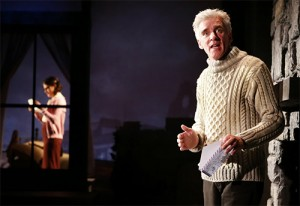Translate Page

Patrick Fitzgerald finds new life in Sea Marks
---
Before you settle into Sea Marks, be warned: the play is not as cozy as it looks.
At first, it seems like Gardner McKay's 1971 script, now being revived at Irish Repertory Theatre, will be a charming and gentle tale of how Colm (an Irish fisherman) and Timothea (a Liverpool book editor) fall in love via letters. But while their affair is always front and center, things get decidedly more complicated when Colm joins Timothea in the city. Suddenly, they're forced to confront not only their mutual inexperience as lovers, but also their bone-deep assumptions about what makes a good life. Neither seems to understand how strongly they believe in their own ethical code until the other starts to challenge it.
That fusion of romantic and moral passion is arguably what made the play such a hit when it originally premiered. For years, it was regularly produced around the country, and it even opened Irish Rep's second season in the fall of 1989.
What's more, Patrick Fitzgerald has starred in both Irish Rep productions, returning to play Colm after 25 years. "I was cast in the same role, and back then, it was remarkably bad casting!" he cracks. "I was twenty-five. I was very young for that role, and I was very green." (Coincidentally, Fitzgerald, who has gone on to a distinguished career, made his stage debut in the Irish Rep's very first production, The Plough and the Stars, in 1988.)
Not that Fitzgerald's original performance is shaping his current one. "I can't remember twenty-five years ago," he says. "I don't even think it helped learning the lines."
And that's likely freed him up to dig into this play's surprising depths. He's realized, for instance, that even the early letter-writing scenes are brimming with the intensity to come. "She's responding to the language and the poetry, so I'm going to take advantage of that," he says, describing how Timothea (Xanthe Elbrick) reacts to Colm's writing. "He's not a dumb fisherman. He can take advantage of that, and I think that's where the strength of the play lies, in the density of the language."
But it's not all in the words. When Colm and Timothea finally meet and make love---which is major for Colm, since he's a virgin---the actors must create a detailed physical language to communicate what they can't necessarily say. "I used to have my shoes off and approach the bed very slowly," Fitzgerald says. "And I thought, 'Well, I'll leave my shoes on and just walk over and take them off next to the bed. So it's much more powerful in a way. 'Without any more fussing around, I'll take you to bed.' He's playing on the team, and he's going for it."
The costumes, too, hint at what's churning underneath the story, particularly Colm's fisherman sweater. We learn that his village uses a specific pattern so that lost seamen can be recognized if their bodies wash to shore. "It's a love-hate relationship between [Colm] and the sweater," Fitzgerald says. "I've even thought about taking the sweater off in [my] last speech."
Fitzgerald will likely uncover a few more things in the show before the end of the run. "Hopefully, I'll be doing this in six weeks' time and still discover something in the last Sunday," he says. "God really is in the details with this play."
Learn more about Irish Rep in this film from our Meet the Theatre series
---
Mark Blankenship is TDF's online content editor
Photo by Carol Rosegg